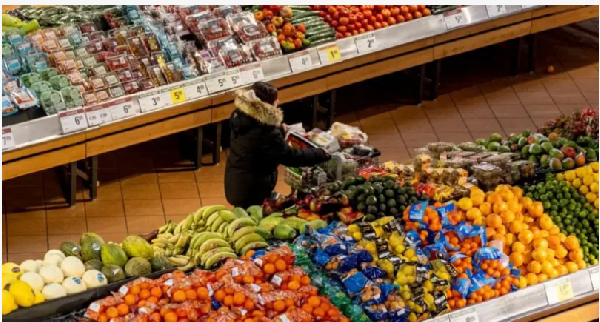Di trade war between di US and Canada don sharply go bad wit President Donald Trump increasing di tariff rate for Canadian imports from 25% to 35%.
Most goods go avoid di increased costs wen dem dey enta di US market becos dem dey currently exempted under one existing North American trade treaty.
But some key products dey really hit hard.
Earlier dis year, Canada respond wit counter-tariffs of dia own for tens of billions of dollars worth of American products. From tomato ketchup to washing machines.
Meanwhile, Canadian Prime Minister Mark Carney say e dey “disappointed” by di increased tariff on some exports to di United States.
Dem say e too early to determine di full impact, sabi pipo say prices don already dey go up on evriday items for Canadians and e go continue to dey rise.
Dis na di breakdown of di products wey don become more expensive.
Fridge and washing machine
Canada don impose counter-tariffs for US-made washers, dryers, refrigerators and HVAC units.
Wit dis and di rise of American sheet-steel prices sake of Trump 50% tariff ontop imported metals, e mean say di sticker price for dis items don gone up, according to Andreas Schotter, professor of international business for Western University for Ontario.
For Canadians, dis don result for di cost of refrigerators and freezers to dey rise by 2% on average.
Dishwashing and laundry appliances go up by 4.5% for June from di same time last year, according to Statistics Canada.
Andrew Barclay, analyst wit di stats agency, say di percentages dey offset by di fact say no be all appliances wey dem dey sell for Canada bin come from di US.
E mean say consumers fit shop around to avoid paying more.
Prof Schotter say some retailers don dey advertise “pre-tariff” sales on dishwashers and heat pumps – “to let dem know say ordinary pricing dey set to move up”.
New and used cars
Di automotive sector dey specially hard hit by US tariffs, sake of how car manufacturing supply chains dey between di two countries.
One vehicle fit cross di US-Canada-Mexico border up to eight times bifor dem go fully assemble am.
Di Trump administration don impose 25% tariff on all cars and trucks wey dem no build for US. Canada don return dia own wit similar reciprocal tariffs, though dem make exemptions for automakers wey dey agree wit di existing North American free trade agreement and dose wey continue to dey manufacture for di country.
Car manufacturers don also dey hit by US metals tariffs.
E don result in higher prices on new vehicles. Di cost go up more dan 5% for June compared to last year, Mr Barclay tok.
“We don also see prices go up on di used car side of tins, wey suggest say pipo fit no fit buy new cars,” e tell di BBC.
Prof Schotter say pipo dey choose to keep dia cars longer to avoid buying new one.
Peanut butter, can soup and oda groceries
Canada counter-tariffs dey target some of US produced or manufactured foods.
Some of dose items don dey subjected to temporary six-month exemption wey go start for April to provide “immediate relief” for Canadian businesses wey dey rely on US products.
Still, grocery shelves dey see impact. Canada largest grocer, Loblaw, don begin dey label items wit “T” to show say di price don rise sake of tariffs.
Di grocer don add label to nearly 7,500 items.
Dem include tomato ketchup and oda tomato sauces wey dem import from US, and pantry staple like peanut butter and jam.
Turkey, pasta and oranges, all of dem don chop tariff and don increase in price.
Michael von Massow, professor of agriculture for Guelph University, say fruit juice prices don rise to 7.5% from last year sake of counter measures on American citrus.
Can soup get 8% increase for di same period sake of steel and aluminium levies, Prof von Massow tok.
Canada get most of dia food packaging – like soup cans – from di US.
Di Loblaw CEO say items wey dem label wit “T” don see 20% reduce in sales on average.
<>Cloth and footwear
For June, unusual price increase on cloth bin hit di market, according to Mr Barclay of Statistics Canada.
While Canada don place counter-tariffs on US clothing imports, e believe say di higher price no dey directly related to dose levies but dem be symptom of di broader ongoing global trade war.
Major manufacturing hubs like China and Vietnam don dey subjected to rising and falling sake of American tariffs, wey don fuel uncertainty for dose sectors.
Di result na 2% jump for di price of clothing and footwear from last year, Mr Barclay say.
“A lot of am get to do wit di emergence of Southeast Asian and Asian clothing hubs, wey don put downward pressure on prices,” e say.
Housing and remodelling costs
Canada home building sector dey worry say di price of materials e dey rely on go go up.
Cheryl Shindruk, executive for residential developing company for southern Ontario, recently tell di Canadian Press say e dey difficult so far to pinpoint di kain extent wey di costs fit rise to.
But di uncertainty don already delay project deadlines as her company move to sourcing materials locally or elsewhere.
She say some materials, like layered glass windows, no fit dey duplicated for Canada or non-US markets, wey mean say she and odas get no choice but to pay di higher prices.
Canada don also target carpets, flooring and shingles wit counter measures. Mr Barclay tell BBC say slight increase don dey for di cost of homeowners maintenance and repairs as a result.
Di prices of plumbing, utilities and structural steel framing don increase, according to Statistics Canada data.
Di Canada Mortgage Housing Corporation (CMHC) bin predict earlier dis year say, ongoing US-Canada trade war go slow di economy and limit housing activity, include buying, selling and construction.
Provinces wey don dey hit harder by tariffs, like Ontario – for part sake of dia significant auto manufacturing sector – dey already see a slowdown for housing by eight to 26%, according to CMHC data.

